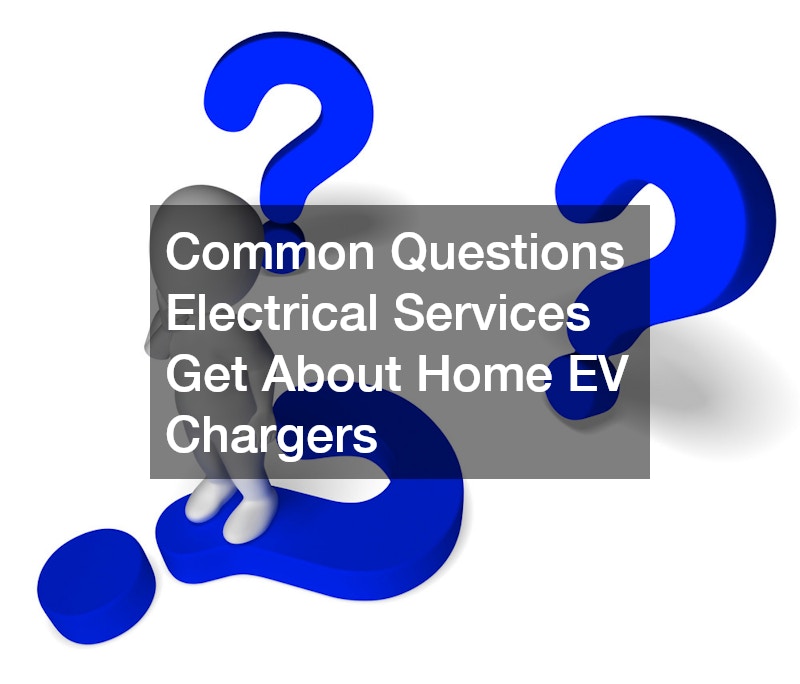As electric vehicles (EVs) become increasingly popular, more homeowners are looking to install electric vehicle chargers in their garages. However, the process of setting up an EV charger at home can be confusing. Electrical services often receive a variety of questions about EV chargers, ranging from installation requirements to cost concerns. In this blog, we’ll address some of the most common questions that homeowners ask when considering a home EV charger.
1. What Type of EV Charger Do I Need for My Home?
There are three main types of EV chargers: Level 1, Level 2, and Level 3.
Level 1 chargers are the most basic and use a standard 120-volt outlet.
They don’t require any additional electrical work, but they charge the vehicle very slowly, typically adding 2-5 miles of range per hour. This option is best for people who drive short distances daily or have a lot of time to charge overnight.
Level 2 chargers are faster and operate on a 240-volt circuit, similar to the power supply used by large appliances like clothes dryers. These chargers typically add 12-60 miles of range per hour, making them a better choice for people who drive longer distances. Installing a Level 2 charger may require electrical upgrades, depending on your home’s existing wiring.
Level 3 chargers, also known as DC fast chargers, are the fastest option, but they are usually found in public charging stations and are not commonly installed in homes due to the high cost and power requirements.
For most homeowners, a Level 2 charger is the best option, offering a good balance of speed and convenience.
2. How Much Does It Cost to Install an EV Charger at Home?
The cost of installing an EV charger at home varies depending on the type of charger, the complexity of the installation, and whether any electrical upgrades are necessary.
Level 1 charger installation: Since this charger uses a standard 120-volt outlet, it usually requires no special installation or additional electrical work. If your garage already has an accessible outlet, you may not incur any additional installation costs, but the charger itself could cost anywhere from $200 to $500.
Level 2 charger installation: Installing a Level 2 charger typically costs between $500 and $2,500. This price includes the cost of the charger itself (ranging from $500 to $1,500) as well as labor for installation. If your electrical panel needs to be upgraded to handle the 240-volt charger, that could add another $500 to $1,000 to the cost of installation.
Keep in mind that many utility companies offer incentives or rebates for installing home EV chargers, which can help offset installation costs.
3. Will I Need an Electrical Panel Upgrade?
Whether you need an electrical panel upgrade depends on the current capacity of your home’s electrical system and the type of charger you plan to install.
For Level 1 chargers, you likely won’t need to upgrade your electrical panel, as these chargers use a standard 120-volt outlet. However, if you plan to install a Level 2 charger, your electrician services may need to evaluate your panel’s capacity. A Level 2 charger requires a 240-volt circuit, and if your panel doesn’t have enough available space or capacity, an upgrade may be necessary.
Upgrading your electrical panel can be an additional cost of $500 to $2,000, but it will ensure that your home can handle the added power demand of the EV charger and other appliances.
4. How Long Does It Take to Install a Home EV Charger?
The installation time for a home EV charger generally takes between 4 to 8 hours, depending on the complexity of the job. If no electrical panel upgrades are needed, the installation process can be completed in a single day. However, if an upgrade is required or if there are challenges with wiring or the placement of the charger, the installation might take longer.
To get an accurate estimate of how long the installation will take, it’s a good idea to consult with licensed electrician services that can assess your home’s wiring and electrical needs.
In conclusion, while the process of installing an EV charger at home may seem complicated, the right information and professional assistance can help you make the right choices for your home and your electric vehicle. By understanding the types of chargers, installation costs, and electrical requirements, you can ensure a smooth and safe installation that will keep your EV charged and ready to go.

